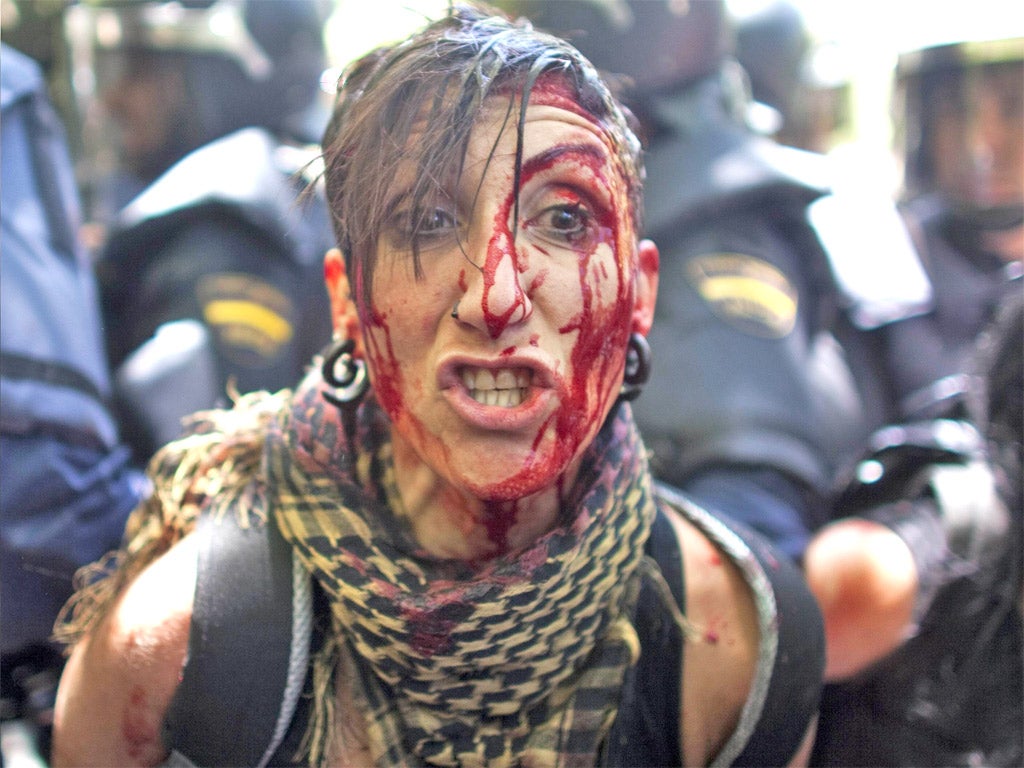Blood, debt and fears: crowds rise up as Spain agrees new €65bn cuts

The Spanish Prime Minister, Mariano Rajoy, unveiled a fresh round of spending cuts totalling €65bn over two years at a noisy session of parliament yesterday. The measures represent the country's latest bid to convince financial markets that its public finances are in order and prevent a debt crisis spreading to the rest of the eurozone.
At the same time, hundreds of striking miners led a rally which stretched for miles along Madrid's main road in protest over cuts in subsidies they say will destroy Spain's coal industry.
The protesters tossed fireworks and clashed with riot police, who fired rubber bullets, as the unions vowed widespread action for the week beginning on 21 July. The demonstrations spread to the capital's parliamentary building and the headquarters of the governing conservative People's Party (PP).
At least one volley of rubber bullets was fired directly at miners, relatives and sympathisers as they gathered outside the Industry Ministry after marching up Madrid's main north-to-south street, the Castellana. The clashes with police and the rubber bullets sent people scurrying for safety.
"Today [Rajoy] has announced a new attack on the unemployed and public employees. They raise VAT, but not a single measure to make the rich pay, who caused this crisis," the leader of the Comisiones Obreras union, Ignacio Fernández Toxo, told the protesters.
The latest cuts are designed to get Spain's budget gap back to within a eurozone limit of 3 per cent of GDP by 2014, down from 8.9 per cent in 2011, and came a day after European Union ministers agreed to pump €30bn into the country's ailing banks – with more to come – and give the government another year to meet its deficit target.
Mr Rajoy did not immediately make clear how much of the cuts – equivalent to about 6.5 per cent of Spain's annual economic output – were in addition to €45bn of savings the government has announced since it took office in December.
Spain's income tax take has tumbled because one in four workers is on the dole and the economy is now in its fifth year of sluggish growth or recession, so the government now hopes to raise revenue by increasing the standard rate of value added tax to 21 per cent from 18 per cent, as expected, as well as introducing a new "green tax" on fuel.
To cut outgoings, the government will slash unemployment benefits, scrap a Christmas bonus for civil servants and axe 30 per cent of local councillors, as well as speed up plans to raise the retirement age to 67 from 65, amongst other measures.
Mr Rajoy has gone back on the PP's election campaign pledges by raising VAT and ditching tax breaks for new home buyers, just months after restoring them when it took power, but the premier said he had little choice if Spain were to balance its books.
"They are not pleasant measures but they are indispensable. We need to borrow money. We are locked in a circle and need to get out. We are at a crucial time that will determine our future," he told MPs.
The Socialist opposition leader, Alfredo Pérez Rubalcaba, said the measures were "unfair and ineffective" and Spain had surrendered control of its economic policy, but he offered to join forces with the government to draw up "a fair austerity plan to promote growth and generate confidence". Spain's benchmark borrowing cost, the rate it pays on its 10-year bonds, eased to about 6.6 per cent after Mr Rajoy's speech, from 6.8 per cent on Tuesday, but was still close to the 7 per cent mark at which Portugal gave up trying to sell bonds last year and asked for a bailout.
The miners rallied in Madrid on Tuesday after marching hundreds of miles from pits in the north of the country, where for weeks they have been engaged in underground sit-ins and blocking roads and railway lines.
Join our commenting forum
Join thought-provoking conversations, follow other Independent readers and see their replies
Comments
Bookmark popover
Removed from bookmarks